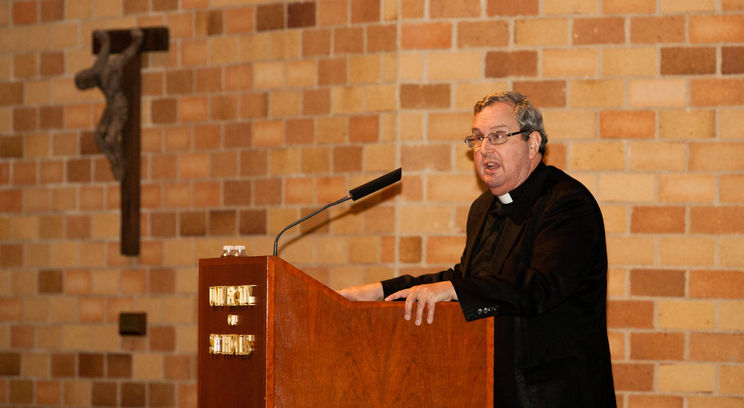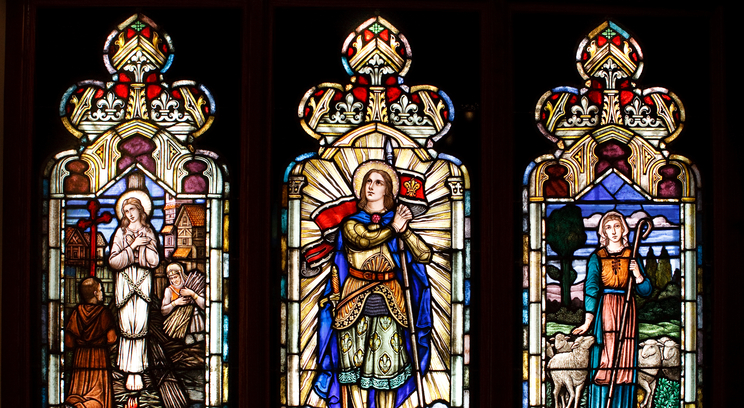Robert Spitzer, S.J., philosopher of science, former president of Gonzaga University and founder of the Magis Center of Reason and Faith, visited the Center for Catholic Studies as the result of a remarkable spirit of cooperation among five departments at the University of St. Thomas, The Saint Paul Seminary School of Divinity, the Science and Theology Network and the MacLaurin Institute. Joining Catholic Studies were the departments of theology, philosophy, physics and engineering. Dr. Philip Rolnick, professor of theology and chair of the Science and Theology Network, believes that Spitzer’s “engagement of recent developments in physics to bolster a doctrine of creation has produced one of the best books available in the growing field of science, philosophy and religion.”
Spitzer met with graduate and undergraduate students, including seminarians, and responded to diverse yet profound questions from them. Rolnick notes, “Father Spitzer’s pastoral gifts were likewise shared on campus as he discussed his other recent book, Ten Universal Principles of Life.” Dr. David Deavel, long-time friend of Spitzer and associate editor of Logos, remarked, “It’s not just Father Spitzer’s expertise in so many different intellectual areas that makes him so masterful in galvanizing discussion among different scholars, it’s the joyful exuberance and boundless curiosity with which he asks and answers questions.”
He was by no means less eloquent and passionate with the students over lunch. Catholic Studies graduate student Jacob Rhein reflected that the cross-disciplinary aspect is “critical to the purpose of Catholic Studies and to an authentic university education, which cannot accept a tacit divide between the so-called ‘soft’ and ‘hard’ sciences. Reality is a unified whole, and Father Spitzer’s conversation tries to find and understand that unity.”
Spitzer’s two recent publications, New Proofs for the Existence of God and Ten Universal Principles of Life, were the themes for the two-day interdisciplinary gatherings. His work reflected the new developments in physics and mathematics that imply that the universe must have had a super intellect bring it into existence. He addressed the big-bang theory – the current consensus among physicists of how the universe began about 13.7 billion years ago – and its alternative, which entails a beginning and the act of creation by a timeless and unrestrictedly intelligible being [God]. Spitzer highlighted the complementarity between the new physics and philosophy and theology. He writes, “Stephen Hawking has asked, somewhat poetically, ‘What is it that breathes fire into the equations [of mathematical physics] and makes a universe for them to describe?’ This question deserves a genuine answer. As a matter of logic, mathematical descriptions may have ontological implications, but they do not function as efficient causes, either metaphysically or materially: They are causally inert. When inflationary cosmology describes string vacua as tunneling into existence from absolute nothingness or from another vacuum state, or even when relativistic quantum field theory describes matter as popping out of the quantum vacuum, neither mathematical construction provides an explanation, let alone an efficient cause, for these events.”
He remarked on several philosophical proofs in this area: metaphysical arguments for God’s existence, Lonergan’s proofs for the existence of God, proofs of a creator of past time and methodological considerations and the impossibility of disproving God. He remarked on the ontological status of the Good, True and Beautiful and ended with theological remarks on man’s yearning for perfections revealed in truth, love, justice, beauty and home. He writes, “By now it will become apparent that the five human desires for the perfect and unconditioned match the five manifestations of absolute simplicity. We may now see our fulfillment of our deepest desires in greater perspective.”
Other lectures from the spring semester
Father Drew Morgan“Philip Neri and John Henry Newman: The Life of an Oratarian Saint”Feb. 13Morgan, provost of the Pittsburgh Oratory, explored the evangelization of culture. When Newman became a Catholic, the Oratory of St. Philip became the context for his vision of the evangelization of culture.
Christopher Shannon“Irish Catholics on the American Screen: or, the Necessity of Re-ethnicizing Hollywood”Feb. 13An author and historian, Shannon looked at varying Irish presences in Hollywood productions from the late 1920s to the early 1950s. He contended that the values in these films were oppositional to those of mainstream American culture. The basic tension in the films was between the impulse to move up the social ladder in the land of opportunity and an almost tribal loyalty to community and family.
Jason Adkins“Unique for a Reason: Why Marriage Matters”Feb. 15Adkins, executive director of the Minnesota Catholic Conference, presented the reasons why the Church defends civil marriage. Included in his defense were reasons regarding the needs of children, the dignity of women, the idea of a “right” to marriage and the social role that marriage plays.
Professor Paolo Carozza“Human Rights, Human Dignity and the Methodology of Human Experience in Law” Human Dignity LectureApril 12Carozza is director of the Notre Dame Law School’s J.S.D. program in international human rights law and director of its new program on law and human development. He argued that the pluralistic and contested understandings of human dignity in the contemporary world make it problematic to employ dignity as a reliable principle for determining the scope and merit of particular claims of human rights. Recognizing human dignity as a foundational principle of human rights does have significant implications for the methods through which lawyers seek to realize the project of securing universal human rights in law.
Dr. Lee Schulman“The Challenge and Opportunities for Liberal Arts and Morally Responsible Leadership in a Catholic University”May 1Shulman has spent his professional life advocating for the importance of teaching at all levels, from kindergarten through graduate school. He advocated for morally responsible leadership in Catholic universities.
Read more from Perspectives







